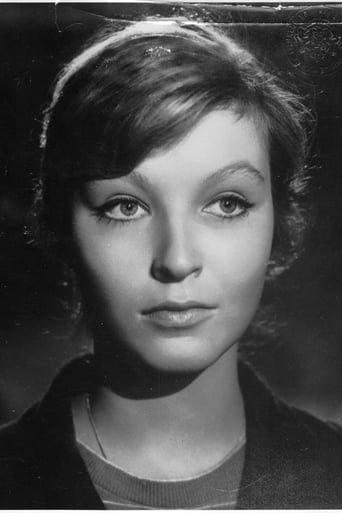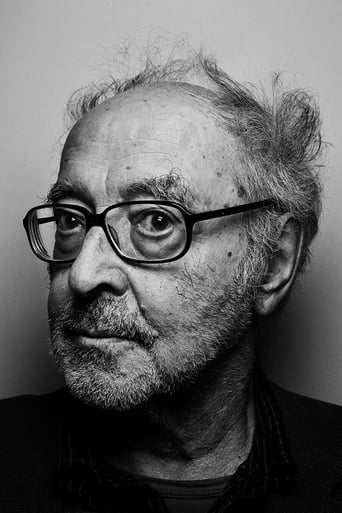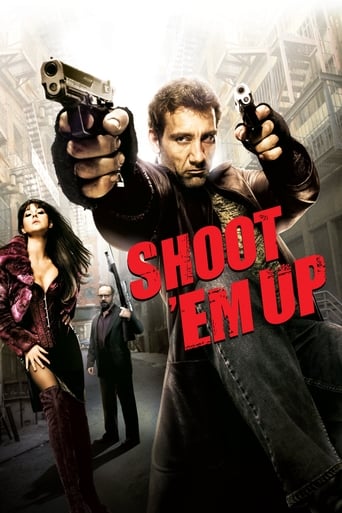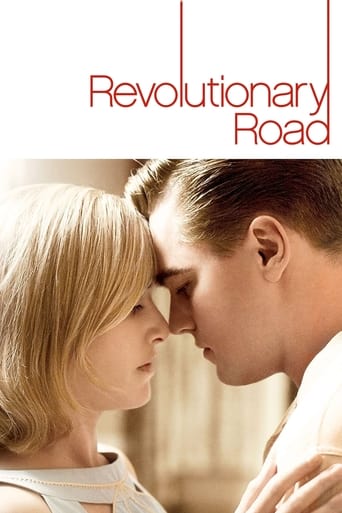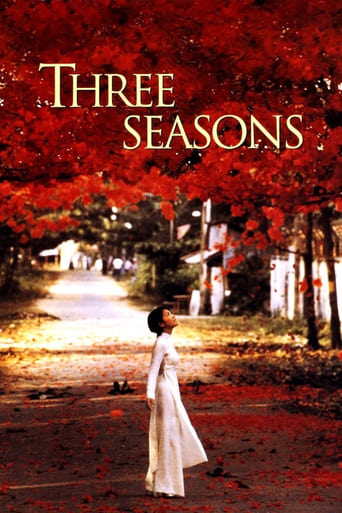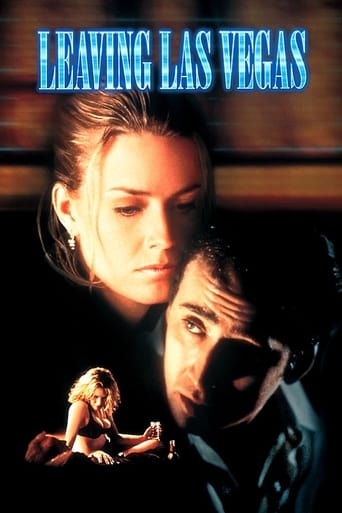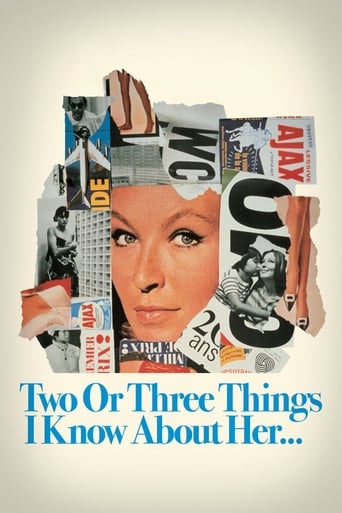
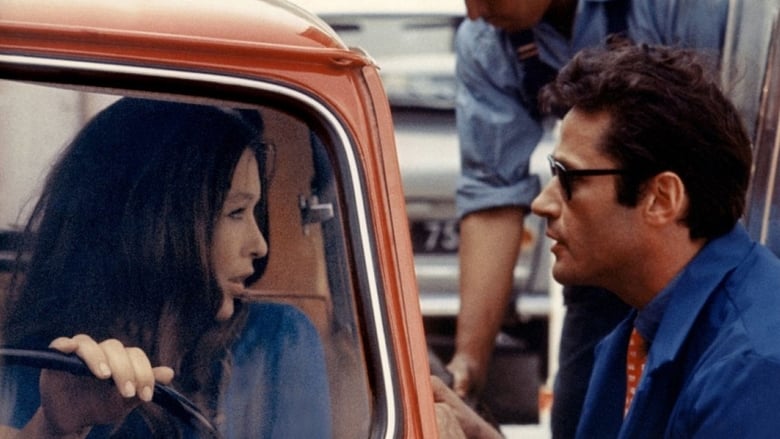
2 or 3 Things I Know About Her (1970)
As the city of Paris and the French people grow in consumer culture, a housewife living in a high-rise apartment with her husband and two children takes to prostitution to help pay the bills.
Watch Trailer
Cast
Similar titles



Reviews
Best movie of this year hands down!
hyped garbage
This story has more twists and turns than a second-rate soap opera.
Actress is magnificent and exudes a hypnotic screen presence in this affecting drama.
At the beginning of 2 or 3 Things I Know About Her, we see a beautiful woman on the screen and the narrator (Jean-Luc Godard) whispers to us some things that he knows about her: that she is the actress Marina Vlady and that she is looking to the right. And yes, she is Marina Vlady, but in a moment the narrator is whispering again that she is Juliette Jeanson, which is the role Vlady is playing in the film. And yes, she is looking to the right, except that it's our right; she is looking to her left. So immediately Godard has launched us into some conundrums involving actor and role as well as subject and object. Godard will insistently whisper his comments on these and other epistemological questions throughout the film, as we watch Marina/Juliette move through a day in which Juliette takes her daughter to a very strange day care center, has her car washed, buys a dress, meets a friend, and turns a few tricks. We also watch the work at construction sites and contemplate the swirling foam on the surface of a cup of coffee. And throughout we are not only whispered to by Godard, but also hear Juliette's thoughts and the conversation of other characters on the nature and limitations of language and art and philosophy, as well as the psychic disturbance and political significance of the Vietnam War. For some, all this will constitute an hour and a half of pretentious and boring fiddle-faddle, the cinematic equivalent of the philosophical bull sessions we had in our college dorms. But let me hasten to defend the philosophical bull session: It stretched our minds at the right time in our lives, when we had the patience for ideas. Too few of us have the patience for ideas anymore, and that may be an incalculable loss. It's easy to mock films like 2 or 3 Things, to ignore their essential playfulness, their overturning of the complacent expectation that a movie should tell a story or excite or entertain us. But pause to gnaw on some of the some of the things that are said in the film, such as "To say that the limits of language, of my language, are those of the world, of my world, and that in speaking, I limit the world, I end it." Or contemplate the fact that the surface of a stirred cup of coffee looks like the spiraling of a galaxy. Or engage your eyes with cinematographer Raoul Coutard's widescreen compositions. Or question the film's obsession with commercialism, which echoes Andy Warhol's exaltation of soup cans and Brillo boxes into art. Or do anything else that the film prods you to do, including wonder why Juliette leads the life she does, and you've got at the heart of what makes Godard such a radically important filmmaker. (charlesmatthews.blogspot.com)
Godard's films often achieve breathtaking and philosophically rich effects seemingly at odds with their seemingly random, uncontrolled, aleatory qualities and unconventional structures.2 Ou 3 Choses Que Je Sais is such a film.Godard hates the institutions of capitalism, industrialism, war-mongering, consumerism, materialism, pseudo-intellectualism wherever they exist, be it the US or France.Paris is alive with endless tympanic construction designed to facilitate capitalism and consumerism while our xenagogue Juliette, awash in weltschmerz, is decaying on the inside as a result of this "progress". Dead objects are still alive while living persons are often already dead.All the film's themes are in the opening sequence: the adverse psychological and retromorphic effects of construction, the vitiative effects of capitalism and consumerism and materialism on people and society, both internally and externally, people as objects and commodities, psychomorphism (objects are alive and will please you more than another human being or nature: pinball machine is alive and breathing and in full motion and more entertaining than anything else in existence, while Juliet Berto (café scene) treats Robert like an inanimate object), life as nothing but a puppet of advertising, consumption, exchange, money, etc.2 Ou 3 Choses Que Je Sais D'Elle is about the impact of commodity culture on subjectivity and social relationships. The film explores the effects of commodification, advertising, and popular culture on social relations, on subjectivity, and on the status of things and consumer goods in the environment, especially their presence as visual artifacts.Godard shows us a Paris under construction transforming into a vast marketplace and site of consumption. Godard explores the frustration and desperation (prostitution...) provoked by the discrepancy between a large sector of the population with limited buying power and the wealth of goods available for consumption. He was telling us that in order to live in Parisian society today, or any capitalistic society, at whatever level on whatever plane, one is forced to prostitute oneself in one way or another, or else live in conditions resembling those of prostitution.He investigates the impact of an economically and architecturally changing Paris on its inhabitants, which includes the correlation between consumerism and prostitution within the "new" city. He investigates how the way people think and feel and live are contingent on the architecture and economy around them, and how they're forcibly caught between the newly built modernized architecture (defined confining spaces) and the high cost of living within that city matrix.Consumer behaviour is created and shaped and manipulated by architecture. The landscape itself is being prostituted. Urban spaces are being remade in a way that negatively mutates the pathology of the inhabitants.Godard attempts to recover the clear, productive reality of objects and images from the artificial signs and manufactured meanings that glut our contemporary world, especially signs and meanings that are generated by and in the service of commerce.Jump-cuts, weird sound effects, voice-overs, narrative absurdities, close-ups and other formal elements all contribute to the Brechtian "alienation effect", and Godard wields these devises to perfection, disrupting normal kinds of identification and visual pleasure and cinematic narration, and re-establishing concrete distance from subjects/objects, in order to make objects appear like new, which allows viewers to approach the elusive real and see things again like new. Repeating for clarity, he disrupts unconscious viewing habits and preconceptions of "reality," enabling us to approach the "elusive real", and we see things again "like new", even if only for a few brief but precious moments.Verfremdungseffekts - defamiliariazation for distanciation: Godard reduces the emotional impact of art, reduces spectator identification, reduces mimesis and direct emotional involvement, provokes viewers into thought, jolts viewers into exercising our rational faculties, rather than allowing us to emote serenely and passively throughout the performance.Godard highlights and exaggerates many reified meanings in order to deconstruct them. He seeks out an excess in the image which is irreducible to the functions attributed to it by its associated languages, and a potentiality for transformation is revealed. His hyper-reification of normal ideas we affix to things shakes up those ideas and calls them into question. He selects best angle not for visual pleasure, but for glimpses of essence, fresh significance.Language itself has been transformed into a (capitalistic) commodity, branded with a specific value and endowed with a specific function, no longer natural but manufactured.The very tools we use to critique and interpret have been contaminated by that which we are critiquing and interpreting.2 Ou Choses Que Je Sais D'Elle is a commentary on commodification and a commodity itself.Jackhammers, motors, percolators, coffee cups, pinball machines, burning cigarettes, construction sites, signs, radio transistors, beer taps, fashion magazines, book titles, stacks of books, postcards, etc, impede communication.The Coffee Cup sequence is pure bliss.The social microcosm is, on the surface, utterly banal; a barman, a pimp, a bored girl, a guy smoking and drinking coffee, a beer tap, a cup, and unknown characters, American shoes, cigarettes, the Cokes are treated by the camera with the feeling that nature lovers reserve for mountains and waves and trees.The Coffee Cup - the rhythm of the film slows as we enter this other space of meditation, drifting out of ordinary perception: a cinematic poem about the quintessence of things and the role of consciousness in a world which is irreducibly other....During the last shot the camera also drifts out of focus - a striking visual metaphor for lack of mental clarity, and other frustrations of consciousness; our Narrator muses on the enigma of death; then the camera eye and time pace it refocuses "pleasurably" (regular pace) to signify clarity and heightened awareness, which is echoed by the narration.Language is the house in which man dwells.
Watching a French film - or more specifically, a film by Jean-Luc Godard - is like having bad sex; the event in itself can be annoying, uncomfortable, and somewhat restless, but at the end of it, you're good for another. That's how it has felt perusing the French New Wave works of the aforementioned radical and acclaimed director, a man who is often regarded as one of cinema's most profound and original directors. Godard rose to fame in the 1960's during the worldwide student movement, where students from all over the world began rebelling from modern conventions - listening to louder, more boisterous music, taking part in more raucous activities, using illegal substances, and showing no respect or care for higher authority.French's student movement turned into something of a cinema movement. To a small group of devoted young cinephiles, French film seemed like a cheap art - one capable of so much more but settled for so very little. Nobody seemed to want to experiment or toy with the medium in anyway. That is until Godard hit the scene, boasting a more assured and confident enigma and housing extremely radical and challenging themes and stylistic choices few had seen before.I equate Godard's films to bad sex because it isn't until after watching them and reading a few thoughts by a miscellaneous bunch online do I realize if I liked them or not. His films are challenging because while watching them, you're sometimes lost in what they're trying to convey. But once you find an idea or some aesthetic attributes to latch on to, dissecting the film is a much easier process. In that respect, Godard's films may also be like an algebra test.2 or 3 Things I Know About Her, however, is sex I never got around to fully enjoying and an algebra test I was never able to pass in the long-run. The film is nowhere near as indescribable or as impossibly vague and empty as Godard's latest work Film Socialisme, but its ability to baffle even fifty years late still holds true. This is a cinematic enigma like few others with sequences ranging from digestible and accessible to a complete mystery on my behalf.What little coherent narrative there is focuses on Juliette Jeanson (Marina Vlady), a married bourgeois mother who begins her descent into prostitution. She drops her child off at a friend's who runs a business of watching the children of prostitutes before going about her day of shopping, cleaning the house, and meeting new clients. Godard's uniqueness in regard to the story is that he makes all of the sex lack any shred of eroticism and instead makes it rather silly (IE: a man makes a woman wear a shopping bag over her head).Godard consistently interrupts this narrative with shots of whatever he feels like pointing the camera at with soft-spoken narration added over the images. Godard's narration often doesn't make a lot of sense, but his unpredictable comments and remarks provide the film with or feeling that he is watching this picture with us and giving his own commentary as it progresses.During the time of 2 or 3 Things I Know About Her's release (1967 to be specific), Godard had become outspoken about his opposition towards Americanization and the ideas of the country as a whole. In the late sixties, prolific advertising began to turn up and, consequently, Godard saw this as an attack and began vocalizing his disdain for advertising. Frequently punctuating this particular picture are stray images of pop art, akin to the style Andy Warhol was famous for.Of course, the meaning for the inclusions of these images is anyone's guess really. Godard makes his impressionistic style known and present and leaves us to form the thesis out of his work for ourselves it seems. This is one of the issues with this film as a whole. A film should never feel like it is handing you a series of clips and telling you to form an idea out of them without giving you a starting point or an anchor to latch on to. Even in the most impressionistic films by people like Ron Fricke or Gus Van Sant, there is a basic idea or concept that one can attach themselves to in order to try and form some ideas about the film's message.Godard never seems to give us a starting point with 2 or 3 Things I Know About Her other than a compilation of clips that could very well have a deeper meaning if we knew just where the hell to begin. The pop art/advertising angle is something to go off of, but the film doesn't seem to focus on that nearly enough for it to be the main theme. And with that, even Juliette just seems like a character Godard includes to simply emphasize his appreciation and admiration for prostitutes.As damning as 2 or 3 Things I Know About Her so often is, the film looks bright, crisp, and extremely clear thanks to the cinematography of Godard's frequent collaborator Raoul Coutard. Coutard gives the film a refined and aesthetically beautiful look, even if what he's showing us doesn't pack in a lot of clarity or real sense. As a film, 2 or 3 Things I Know About Her baffles beyond belief and fails at stringing together a coherent and digestible narrative. As an essay on film, it kinda works - if only I didn't have to cheat to figure out what could be an acceptable answer to it.Starring: Marina Vlady. Directed by: Jean-Luc Godard.
Godard is a God ard. Some people find his films easy. Some find his films hard, Godard is a cinema BardWith "Breathless," Godard created new wave cinema in 1960. With this movie, Godard created postmodern cinema. The amazing thing is how much this film captures a moment in time and space. In fact, in one scene, we are told that it is being filmed on August 17, 1966. We can say that this the date when the Postmodernist world was born.One has to see it as a transition from Pop Art to Postmodernist art. Part of the film is obsessed with the artistic nature of household products. Part of the film is a meditation on our lack of being and our amazing relationship to language.Godard's treatment of woman is quaintly pre-feminist. He is treating them as sex objects,yet at one moment he asks a woman to speak about the sex between her legs. The woman rebukes her and tells her its stupid. Another astonishing moment in a film that has many.The film is non-narrative for the most part. It is Brechtian theater translated into cinema. Godard proves that non-narrative cinema can provide a great deal of pleasure, foreshadowing the future - present cinema.Godard is a God ard.
